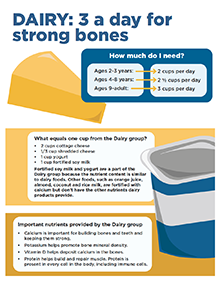Editor’s note
The following abstract describes a publication that is available as a downloadable PDF.
See the companion publication N1047, Dairy Foods Poster.

Abstract
This handout provides information regarding dairy foods in your diet.
Topics
- Daily Allowance
- Examples
- Nutrients
- Facts
- Calcium
- SNAP
Pages
- 2
See handout content below.
Dairy: Three a day for strong bones
How much do I need?
Ages 2–3 years: 2 cups per day
Ages 4–8 years: 2½ cups per day
Ages 9–adult: 3 cups per day
What equals 1 cup from the Dairy group?
- 2 cups cottage cheese
- 1/3 cup shredded cheese
- 1 cup yogurt
- 1 cup fortified soy milk
Fortified soy milk and yogurt are a part of the Dairy group because the nutrient content is similar to dairy foods. Other foods, such as orange juice, almond, coconut and rice milk, are fortified with calcium but don’t have the other nutrients dairy products provide.
Important nutrients provided by the Dairy group
- Calcium is important for building bones and teeth and keeping them strong.
- Potassium helps promote bone mineral density.
- Vitamin D helps deposit calcium in the bones.
- Protein helps build and repair muscle. Protein is present in every cell in the body, including immune cells.

Choose fat-free or 1% milk.
Saturated fat in milk and milk products can raise cholesterol levels in the blood, which can increase the risk for heart disease.
Help children get the important nutrients the Dairy group provides.
- Offer milk with meals.
- Choose fat-free or low-fat milk for children over the age of 2.
- Limit sweetened drinks.
Keep dairy foods safe.
Avoid raw (unpasteurized) milk or products made from unpasteurized milk. Unpasteurized milk can have harmful bacteria that can cause illness that may be life-threatening. Pasteurization destroys these bacteria. Keep dairy foods refrigerated.
Other sources of calcium
- Calcium-fortified juice, cereal, bread and milk made with soybeans, rice or almonds
- Canned fish with bones such as sardines or salmon
- Soybeans and other soy products
- Leafy green vegetables such as collard or turnip greens, kale and bok choy